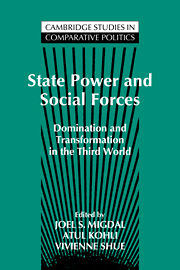Book contents
- Frontmatter
- Contents
- Preface
- List of contributors
- State Power and Social Forces
- Introduction: developing a state-in-society perspective
- PART I THEORETICAL AND METHODOLOGICAL CONSIDERATIONS
- PART II STATES: EMBEDDED IN SOCIETY
- 2 Traditional politics against state transformation in Brazil
- 3 State power and social organization in China
- 4 Centralization and powerlessness: India's democracy in a comparative perspective
- 5 States and ruling classes in postcolonial Africa: the enduring contradictions of power
- PART III SOCIAL FORCES: ENGAGED WITH STATE POWER
- PART IV CONCLUSION
- Index
2 - Traditional politics against state transformation in Brazil
Published online by Cambridge University Press: 05 June 2012
- Frontmatter
- Contents
- Preface
- List of contributors
- State Power and Social Forces
- Introduction: developing a state-in-society perspective
- PART I THEORETICAL AND METHODOLOGICAL CONSIDERATIONS
- PART II STATES: EMBEDDED IN SOCIETY
- 2 Traditional politics against state transformation in Brazil
- 3 State power and social organization in China
- 4 Centralization and powerlessness: India's democracy in a comparative perspective
- 5 States and ruling classes in postcolonial Africa: the enduring contradictions of power
- PART III SOCIAL FORCES: ENGAGED WITH STATE POWER
- PART IV CONCLUSION
- Index
Summary
Recent military regimes in the Southern Cone of Latin America promised profound change, brought significant force to bear to support the cause of change, but delivered surprisingly little. Beginning in Brazil in 1964 and subsequently in Argentina in 1966, Uruguay and Chile in 1973, and again in Argentina in 1976, militaries staged coups not to transfer power to rival civilian factions – their traditional pattern – but to rule directly. Although their intentions were eventually to return their countries to civilian rule (albeit with no timetables for doing so), they defined theirs as regimes not merely of transition but of transformation. By reorganizing economic and political life, by depoliticizing the state and weakening the capacity of society to make demands of it, they expected to create modified, more “workable” democracies, ones less vulnerable to future recurrences of economic and political chaos. Their steps were extraordinary and novel: They concentrated power in the ministries and agencies of the executive branch of government and handed major policy decisions over to technocrats. They achieved immediately high levels of state autonomy, most remarkably even from civilians who had supported military takeovers – traditional economic and political elites.
With the salutary trend toward democratization in Latin America in the 1980s, which ended military rule on most of the continent, the failure of the region's military governors to translate quick sociopolitical reform into deeper change of a lasting nature became manifest.
- Type
- Chapter
- Information
- State Power and Social ForcesDomination and Transformation in the Third World, pp. 37 - 64Publisher: Cambridge University PressPrint publication year: 1994
- 8
- Cited by

